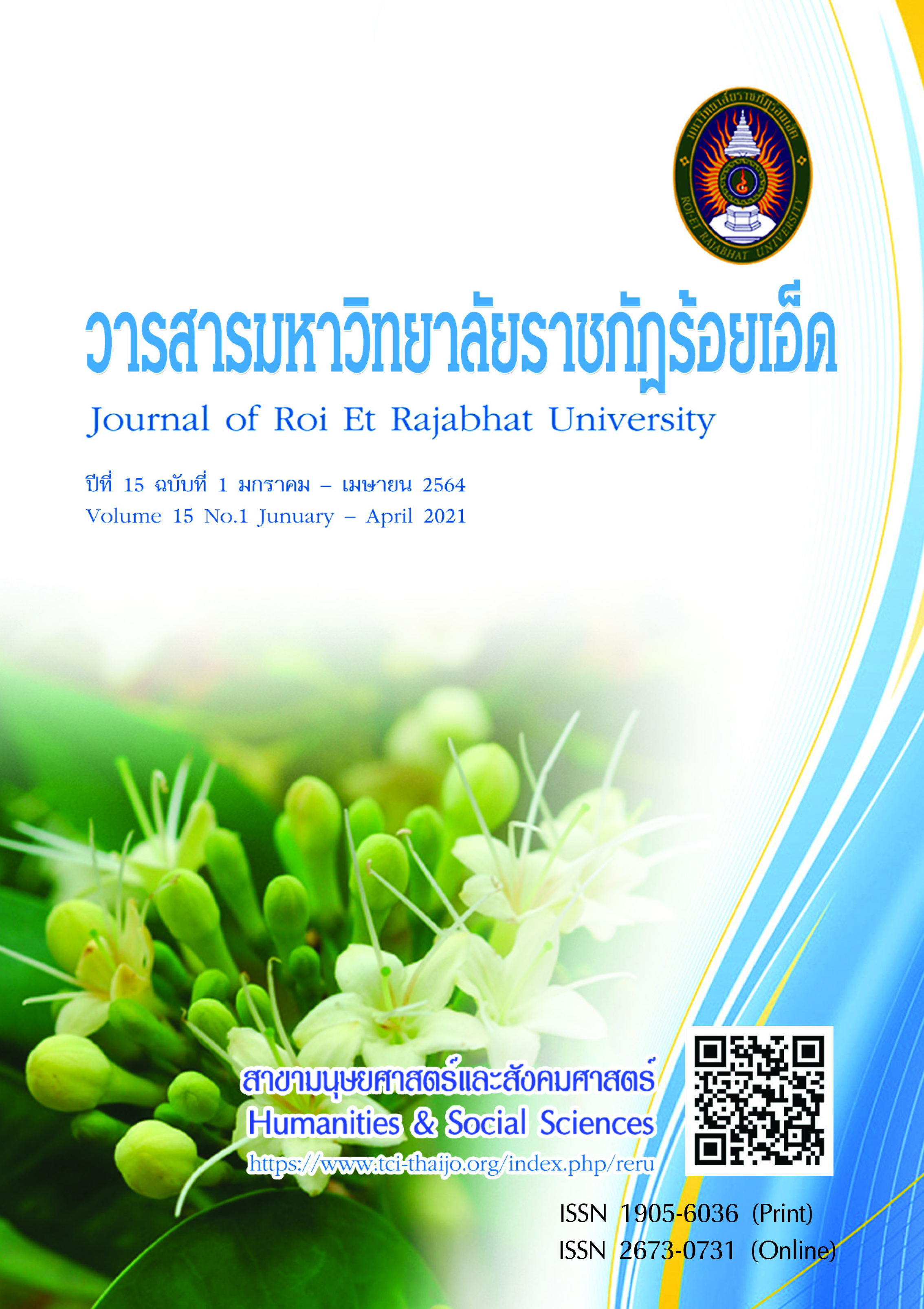Learning Process Management Model of the Courage to Teach Project
Keywords:
Learning process model, The courage to teach project, Transformative learningAbstract
Objectives of this research were 1) to study components on the learning process of the courage to teach project and 2) to design and develop a model of the learning process of the courage to teach project. The designing and developing of learning process management of the courage to teach project consisting of 4 steps as follows 1) data analysis, 2) data synthesis, 3) model creation and 4) evaluation of the model. The data sources used in the research were a group of qualified people and experts for in-depth interviews and evaluating the model and the courage to teach project. The tools used in the research were an interview form, a participating observation form and a model evaluation form. The research found that 1. There were 6 components of the learning process of the courage to teach project including 1) leaners, 2) facilitators, 3) contents, 4) learning activities, 5) medias/learning sources and 6) learning environment. 2. The model of the learning process of the courage to teach project had 8 components including 1) context of teachers’ roles, the context of learners, context on learning, 2) goals, 3) principles, 4) objectives, 5) inputs including factors influencing change on components of learning process and the courage to teach project, 6) the process were learning sets of teachers awakening themselves, teachers asking powerful questions, teachers designing the learning and empowering communities of courage teachers, 7) outputs including characteristics of brave teachers including design and creation of safe learning areas, self-reflection, self-acceptance and self-esteem, deep listening, empathy, non-violent communication and ability of asking powerful questions, and 8) reverse effects. 3. Evaluation results of the learning process model of the courage to teach project found that the overall at a high level. ( = 4.50)
References
โครงการครูกล้าสอน. (2560). รู้จักครูกล้าสอน. สืบค้นเมื่อ 15 มกราคม 2563, จาก https://www.kruklasorn.org
จิรัฐกาล พงศ์ภคเธียร. (2553). จิตตปัญญาศึกษา: การเรียนรู้สู่จิตสำนึกใหม่. กรุงเทพฯ: แปลนพริ้นติ้ง.
จุมพล พูลภัทรชีวิน. (2551). จิตตปัญญาศึกษา : รุ่งอรุณแห่งจิตสำนึกใหม่ทางการศึกษา. สืบค้นเมื่อ 10 มกราคม 2563,
จาก http://www.jitwiwat.blogpost.com/2008/10/blog-post_24.html>
ชัยยงค์ พรหมวงศ์. (2553). การจัดระบบทางการศึกษา (พิมพ์ครั้งที่ 6). นนทบุรี:มหาวิทยาลัยสุโขทัยธรรมาธิราช.
ณัฐฬส วังวิญญู และคณะ. (2550). คู่มือกระบวนกรศาสตร์และศิลป์แห่งการหันหน้าเข้าหากัน. กรุงเทพฯ: วังน้ำชา.
ธนา นิลชัยโกวิทย์. (2552). ศิลปะการจัดกระบานการเรียนรู้เพื่อการเปลี่ยนแปลง: คู่มือกระบวนกรจิตตปัญญา. นครปฐม: เอสพีเอ็นการพิมพ์.
มหาวิทยาลัยธรรมศาสตร์. (2562). โครงการก่อการครู. สืบค้นเมื่อ 15 มกราคม 2563, จาก https://www.lsed.tu.ac.th
วิจักขณ์ พานิช. (2551). เรียนรู้ด้วยใจอย่างใคร่ครวญ (พิมพ์ครั้งที่ 2). กรุงเทพฯ: ภาพพิมพ์.
วิศิษฐ์ วังวิญญู. (2553). โลกปัญญาจิตที่วิศิษฐ์ลิขิตเอง. กรุงเทพฯ: วังน้ำชา.
สำนักงานเลขาธิการสภาการศึกษา. (2558). สถานภาพการผลิตและพัฒนาครูในประเทศไทย. กรุงเทพฯ: พริกหวานกราฟฟิค.
Cranton, P. (2006). Understanding and Promoting Transformative Learning: A Guide for Educators of Adults (2nd ed.). San Francisco, CA: John Wiley&Sons, Inc.
Cranton, P. (1996). Professional Development as Transformative Learning: New Perspective for Teachers of Adults. San Francisco, CA: Jossey-Bass Inc.
Carl, J. (1933). Modern Man in Search of a Soul. New York: Harvest.
McAllister, M. (2011). STAR: A transformative learning framework for nurse educators. Journal of Transformative Education, 9(1), 42-58.
Mezirow, J. (1978). Perspective transformation. Adult Education, 28(2), 100-110.
Parker, J. (2007). The Courage to Teach: Exploring the Inner Landscape of a Teacher's Life.
th Anniversary Edition. Bangkok: Suan Ngeun Mee Ma.
Downloads
Published
How to Cite
Issue
Section
License
บทความที่ได้รับการตีพิมพ์เป็นลิขสิทธิ์ของวารสารมหาวิทยาลัยราชภัฎร้อยเอ็ด
ข้อความที่ปรากฏในบทความแต่ละเรื่องในวารสารวิชาการเล่มนี้เป็นความคิดเห็นส่วนตัวของผู้เขียนแต่ละท่านไม่เกี่ยวข้องกับมหาวิทยาลัยราชภัฎร้อยเอ็ด และคณาจารย์ท่านอื่นๆในมหาวิทยาลัยฯ แต่อย่างใด ความรับผิดชอบองค์ประกอบทั้งหมดของบทความแต่ละเรื่องเป็นของผู้เขียนแต่ละท่าน หากมีความผิดพลาดใดๆ ผู้เขียนแต่ละท่านจะรับผิดชอบบทความของตนเองแต่ผู้เดียว





